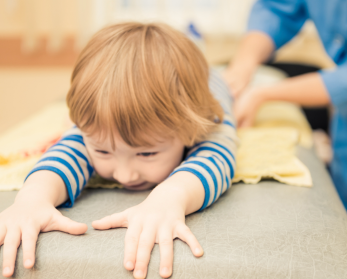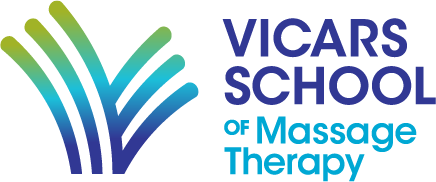This is the third post in our series about pediatric massage. So far in the series, we’ve looked at research in the field of infant massage and talked to an RMT who teaches infant and child massage to her clients. Today, we’re reviewing the research into the effects of massage therapy on older children.
When Edmonton-based teacher Carla C. began going to a registered massage therapist (RMT) in 2021, she took her four-year-old son, Lincoln, with her. For the first few visits, Lincoln played quietly in a corner of the room or nestled himself between his mother’s legs while she was being massaged. On one visit, Lincoln announced that he too wanted a massage.
Carla supported his decision. Lincoln had been born with serious health conditions, necessitating open heart surgery when he was only a few weeks old. While Carla had given Lincoln massages since his birth, stroking his arms and legs and back, she had avoided the scar on his chest. She thought touching it would be too much of a reminder for both of them of those fraught early years.
The RMT guided Lincoln through all aspects of the massage treatment that day, which given his age and size was only about 15 minutes long. She asked him if it was OK for her to touch his legs and arms and talked to him about the sensations he was feeling. When she came to his chest, she explained how important it was to massage his scar. “Treat it like a twisty little snake,” she said, “and roll it between your fingers to smooth it out and make it softer and less sticky.”
Carla realized that by encouraging Lincoln to massage his scar, the RMT was also giving him an important message: that the scar was his, part of his body, an important part of his story, and not something to be ignored or feared.
Carla and Lincoln both started regularly massaging his scar. Several months later, Carla says that it is noticeably more pliable and has less profile on his chest.
The benefits of pediatric massage are backed by research
Stories like Carla and Lincoln’s show the wholistic effects of massage in young people, encompassing mind and body. This is something that pioneering touch therapy researcher and psychologist Dr. Tiffany Field has spent her career investigating. Dr. Field is internationally renowned for her the quality of her research on the effects of massage on infants. (Her research has shown that massage therapy led to faster weight gain and discharge from hospital for infants born prematurely, and that for full-term babies the benefits include relieving jaundice, better sleep, reduced stress in parents, and strengthening infant-parent bonding. Read all about it in the first post in our series).
Dr. Field conducted a comprehensive review of research that has been done on the effects of massage therapy in older children (between a year of age and adolescence), and in children with psychological and mental health conditions. The results make a very strong case for pediatric massage therapy.
Children with autism spectrum or attention deficit hyperactivity disorders were reported to have greater attentiveness, fewer sleep problems, and decreased hyperactivity after a month of regular short massages.
Preschoolers to adolescents with psychological difficulties including aggression, anxiety, depression, and posttraumatic stress disorder (PTSD) showed improvements in their symptoms and a decrease in the levels of stress hormones in their bodies. As an example, child survivors of Hurricane Andrew who were experiencing severe PTSD showed much lower PTSD symptoms after a month of daily massage treatments. Studies on children with anorexia and bulimia experienced increases in dopamine and improved management of their eating disorders.
In children with symptoms resulting from a number of physical conditions, massage therapy—often delivered by parents—resulted in reductions of gastrointestinal problems from diarrhea or constipation; spasticity from cerebral palsy and hypotonicity (flaccidity) from Down’s Syndrome; and increased motor development in children with motor development delays. Children with painful diseases, with conditions such as burns, or who had undergone painful procedures, experienced pain relief, better sleep, and reduced anxiety after massage therapy.
Why is massage therapy so good for children and teens?
The common thread running through the majority of the assessed studies is the calming effect resulting from reduction of stress hormones and increased production of “happy” hormones such as dopamine, purported to be results of massage therapy. Dr. Field and other researchers have identified the possible bodily mechanisms that are “translating” massage into these physiological and other effects. Earlier in this series, we outlined some of the potential mechanisms activated by massage in preterm infants: the vagus nerve, responsible for controlling stress hormone release, activates the gastric system, which enables digestion.
Additional mechanisms were seen in the studies on older children. Dr. Field has proposed that the reason massage therapy has such an effective role in pain management is that it engages the body’s touch receptors. These nerves are longer and more insulated than pain receptors—but once activated, their signals reach the brain faster and can “drown out” the messages being sent by the pain receptors.
In the broader context of the nervous system, Dr. Field posits that massage potentially has an effect on the parasympathetic nervous system, responsible for the “rest and digest” functions in the body including heartbeat, vagus nerve activity, and digestion. When activated by moderate-pressure massage, the parasympathetic nervous system “overrides” the sympathetic (fight or flight) nervous system, decreasing the release of stress hormones such as cortisol and increasing the release of immune fighter cells and anti-pain chemicals such as serotonin.
When parents are involved in massaging their children, they also benefit. Several studies by Dr. Field and others investigated the effects of parent-given infant and child massage on child-parent attachment and attunement, the receptiveness between caregiver and child. Parents reported less stress, improved wellbeing, a greater sense of competency with their parenting skills, and for those with moderate mental health issues, reduced symptoms of depression.
This effect doesn’t seem to be restricted to direct parent-child relationships : grandparents and other trusted caregivers can benefit as well. In a study published in the Journal of Applied Gerontology, older adults were given massages for a month and then gave massages to infants over a month. Measurement of cortisol from saliva samples showed they were calmer and more relaxed after massaging the infants.
All of the studies were conducted over short term periods, and Dr. Field and other researchers stress the need for further high-quality, longer-term research in order to produce evidence that can be used by decision-makers on funding and policy changes. While research is vital to ensure pediatric massage is accepted as a valid clinical tool, its popularity continues to grow.
And as Carla says, “It’s important that as my son grows, he sees massage therapy as another important therapy with a trusted professional alongside the other therapies he receives.”





